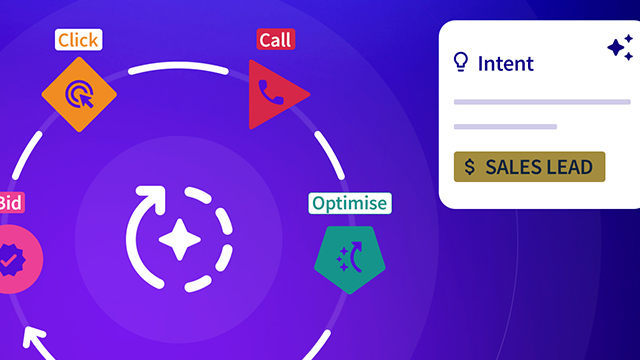
Before the call
The Infinity call tracking platform connects the customer journey to the phone call, giving you the insights you need to make sure you’re investing your marketing budget in the things that work.
With call tracking, you can see the true impact of your work and optimise campaigns to send performance soaring.

During the call
Conversations with customers are a goldmine of untapped intel. Infinity’s Conversation Analytics suite automatically unlocks it from every phone call you make or take.
Conversation Analytics makes call monitoring a piece of cake. It will help you market more efficiently, sell smarter, and delight customers every time they get in touch.

After the call
Smart Match is the fastest and easiest way to link call revenue to marketing activity.
With it, you can pinpoint where your most valuable calls are coming from, and make ‘Smarter’ sales and marketing decisions. In just a few clicks, it’ll help you cut budget waste, boost campaign performance, and lift AOVs.
174%
YoY uplift in sales from PPC

63.8%
Reduction in cost-per-acquisition
125%
Increase in budget for ad spend
With call analytics in your corner, you’ll always make the right call
Make smarter marketing decisions
Call tracking and Smart Match will help you make sure you never waste a penny of your budget again. Putting them to use will help you see which activities you should double down on, and claim all the ROI credit you deserve.
Throw Conversation Analytics into the mix and your campaigns will reach a whole other level.
Accelerate your sales
Make sure you never miss an opportunity to close with Infinity. You’ll be able to tailor conversations with buyers based on their journeys. And, you’ll be able to build a team of lean, mean, closing superstars in no time thanks to custom scorecards.
Hitting your targets will become a piece of cake.
Run your contact centre like a well-oiled machine
Infinity will take your understanding of contact centre operations to the next level. As well as seeing what’s driving call volume, Conversation Analytics automatically feeds you the intel you need to improve FCR, slash AHT, and deliver Grade A customer experiences.
Create better service experiences
Infinity’s advanced call analytics tools will help you create the frictionless experiences customers crave.
Get the insights you need to identify negative experiences and turn them into positive ones. Delight your customers and produce successful outcomes time and time again.
Stop compliance issues derailing your growth
Automatically flag the risks in conversations without having to listen in. Conversation Analytics will help you avoid compliance catastrophes, and make QA a quick and pain-free experience.
It’s been incredible to see the amount of data and insight we’ve been missing. We’ve been able to adapt our paid media strategy to save money and drive up conversions.
Rachael Harker, Digital Performance Manager

Infinity is very flexible and results are immediate
Mark Woodcock, Commercial Director

Call analytics software FAQs
Call analytics solutions like Infinity exist to help you measure, analyse, and report on what happens before, during, and after phone calls. The fact they’re AI-powered and work around the clock means they’re capable of gathering data and performance insight from every single call you make and receive. In short, a good call analytics platform will help you make much smarter and more informed business decisions. With it, you’ll understand the strengths and weaknesses in your marketing campaigns, sales tactics, call handling processes, and contact centre operations.
Call analytics are often the unsung hero in the business analytics toolkit. By analysing conversations in real-time, they enable you to hear the unfiltered truth from your customers and lift the lid on performance and process.
Connecting clicks to calls and revenue:
Understanding where your best leads are coming from is the key to optimising your marketing processes and budget. If your customer can buy or book a meeting over the phone and you’re not measuring these conversions, you’re only seeing a slice of the truth. Call analytics tools like call tracking will help you see the whole picture by plugging this gap in your attribution. With this clarity, you can eliminate waste and focus resource on what really works.
Levelling up sales and service performance:
Call analytics software will help you level up your call monitoring capabilities. By removing the need for manual listening and dip testing, they’ll help you get a granular and detailed picture of each agent's performance.
Furthermore, you’ll be able to identify strengths and weaknesses and provide the specific support each member of your team needs to help them perform at their best.
Call analytics software won’t just help you understand your calls; it’ll help you understand the pulse of your business.
Call analytics software will help marketers build a much more accurate picture of performance, and make smarter business decisions about where to invest and how to engage your customers.
The insights they provide will help you:
- Eliminate budget waste and maximise ROAS
- Improve messaging and boost conversion rates
- Keep your pipeline full and stretch margins
- Report your true ROI, claim the credit you deserve, and ringfence your budget
By actively using call analytics software, sales leaders can unlock the intel they need to improve call handling and close more deals.
Call analytics tools will help you:
- Fill your queues with quality leads
- Arm your team with deal-swinging insights in real-time
- Upskill the smart way and build a team of superstars
- Lift your AOVs, grow your bottom line, deliver record-breaking quarters, and smash your targets
With call analytics software, customer service teams will be able to stop bad experiences from ruining relationships and your reputation.
The insights they uncover will help you:
- Delight customers every time they get in touch
- Send net-retention and NPS soaring
- Process queries like a pro and get AHT tumbling
- Give your team the support they need to nail FCR
Call analytics software like Infinity will help contact centre leaders uncover hidden insights from conversations without having to spend hours listening in. So, improving call handling and keeping your team and customers happy becomes much easier.
In short, this software will make sure you:
- Save hundreds of hours and hear the full story
- Delight customers every time they get in touch
- Keep your team engaged and stop churn impacting performance
- Get your contact centre running like a slick, well-oiled machine
Lifting the lid on what happens during calls and gives all the intel you could possibly need to avoid compliance catastrophes.
Automatic call analytics software will monitor calls for you at scale, so you can:
- Streamline your QA process and save hundreds of hours
- Stop breaches from slipping through the cracks
- Provide the guidance needed to make compliance issues a thing of the past
- Rest easy knowing that you won’t get caught out by unexpected fines and legal fees
Call analytics news and views
14 Jan 2026
How marketers use call tracking to win: from blind spots to better decisions
Get the full story







